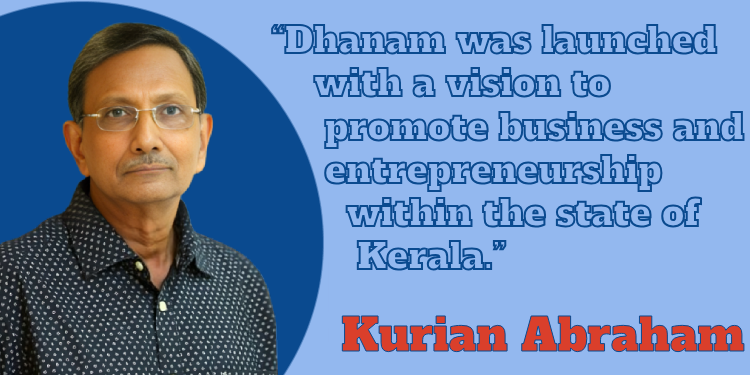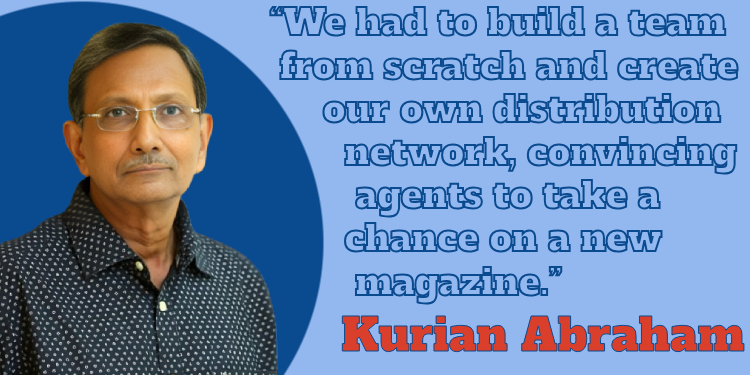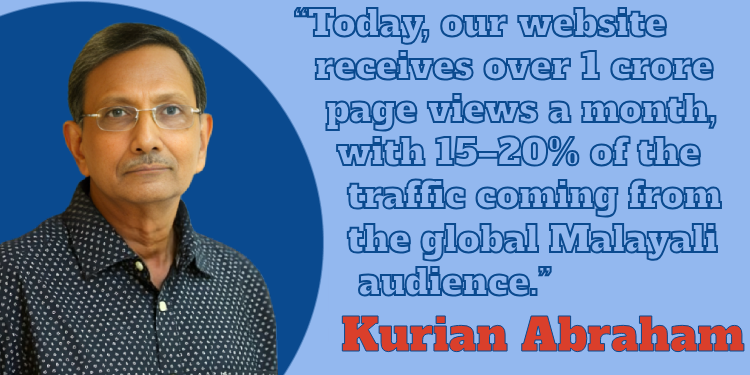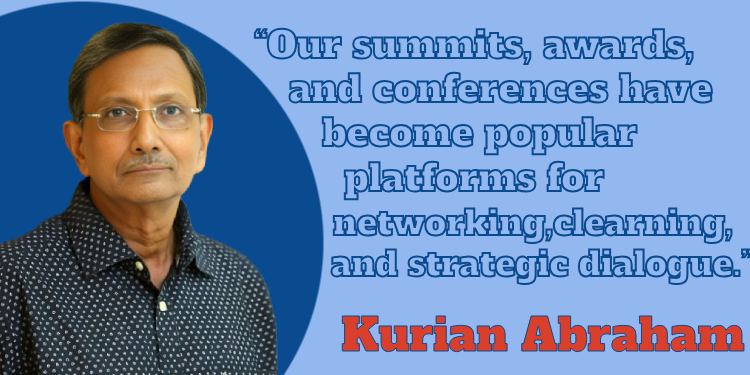From the lecture halls of commerce to the dynamic world of publishing, Mr. Kurian Abraham’s journey is a remarkable story of passion, perseverance, and vision. A former lecturer and journalist, Mr. Abraham left behind a promising academic and media career—including brief stints at Indian Express and Financial Express in Delhi—to pursue his love for magazines. He began his publishing journey with Kerala Spectrum, an English magazine launched from Delhi to cater to non-resident Keralites across India and the globe.
Building on this experience, he founded Rubber Asia in 1985—India’s first international magazine dedicated to the rubber industry. Just two years later, sensing an untapped opportunity in regional business journalism, he launched Dhanam, Kerala’s first business magazine in Malayalam. At a time when the State’s economic climate was underwhelming and the local media barely covered business developments, Dhanam filled a critical void. Over the past 37 years, it has grown to become Kerala’s No 1 business publication and one of India’s premier regional business magazines.
Over the years, Dhanam diversified into books, business events and digital publishing. Today, Dhanam Business Media is one of the most respected media organisations in the state.
In this exclusive interaction with MediaNews4U, Kurian Abraham, Chairman & Chief Editor of Dhanam Publications, shares insights from his extraordinary journey, his thoughts on the evolution of business media, and the values that have sustained him through the decades: passion, positivity, teamwork, and an unwavering love for reading and business storytelling.
Q: How was Dhanam conceptualized back in 1987, and what were some of the key challenges and turning points that shaped its 37-year journey?
Kurian Abraham: My passion for magazines began during my college days, where I avidly read all available publications. Though there were political magazines like Blitz and Current, and a few general interest magazines, I felt there was a gap. I aspired to create something impactful, inspired by global benchmarks like Reader’s Digest.
After completing my journalism course at the Indian Institute of Mass Communications, Delhi and gaining experience with Indian Express and Financial Express, I launched Rubber Asia, which went on to become Asia’s No.1 magazine for the rubber industry. During this time, a friend casually suggested starting a business magazine from Kerala. I took the plunge. The idea resonated with readers, especially since Kerala had immense potential but was lagging in business development. The rest is history.
Back then, business was often looked down upon in Kerala. I wanted to change that mindset and bring respectability to entrepreneurship, business and good businessmen. Thus, Dhanam was launched with a vision to promote business and entrepreneurship within the state.
The challenges were many—lack of editorial talent with business knowledge, distribution hurdles, and resource constraints. We had to build a team from scratch and create our own distribution network, convincing agents to take a chance on a new magazine. Despite these hurdles, we persevered and steadily carved a niche for ourselves in Kerala’s business media landscape.

Q: How has Dhanam evolved from print to digital in response to changing media consumption trends, and how has its readership profile transformed over the decades?
Kurian Abraham: We were relatively late in making a major digital push—only around 2018 did we begin to aggressively expand online. However, the traction we gained was rapid. Today, our website DhanamOnline.com sees up to 24 lakh visitors a month with over 1 crore page views, including 15-20% traffic from outside India. Our flagship video series, The Dhanam Titan Show, featuring in-depth interviews with top entrepreneurs, is widely appreciated. Last year, we also started english.DhanamOnline.com, an English business and financial news website, focused on Kerala.
Digital platforms have allowed us to reach a global Malayali audience more efficiently. We’re active across social media, and while general-interest content performs best online, we aim to maintain a balance by also offering in-depth, insightful business stories.
Traditionally, Dhanam was eagerly awaited by business-related families, entrepreneurs, bureaucrats, professionals, investors and aspiring entrepreneurs. Many used it to inspire younger generations by showcasing the value and dignity of business. That legacy continues today, though our audience now also includes politicians, both college & school students, NRIs and professionals from diverse sectors.
Q: How has Dhanam shaped Kerala’s business narrative by supporting entrepreneurship and highlighting future success stories?
Kurian Abraham: From the beginning, Dhanam stood out as the only voice championing business in Kerala. At a time when business was viewed with skepticism and often disdain, we provided visibility and respectability to entrepreneurs. Our coverage encouraged other media to follow suit, gradually changing public and institutional attitudes.
Our initiatives, including conferences, summits, and workshops, created platforms for networking, learning, and idea exchange. Events such as the Annual Business Summit & Award Nite, BFSI Summit, and Healthcare Summit have drawn business leaders, policymakers, and global investors.
One of our landmark contributions was showcasing Kerala’s Top 100 Entrepreneurs, way back in the mid ‘90s, which even surprised policymakers who were unaware of the state’s entrepreneurial depth. Our special issues featuring Top 100 NRI Businessmen and Professionals, Top 100 Business Families of Kerala, Top 100 Brands of Kerala, Top 100 Women Entrepreneurs of Kerala were bestsellers.
We’ve influenced investment habits, promoted wealth creation, introduced concepts like family business management, and hosted Kerala’s first global investor summit in 2000, first Brand Summit and first family business conclave, well before such ideas became mainstream.
We’ve also spotlighted early-stage entrepreneurs who went on to build large enterprises. For example, Kochouseph Chittilappilly, founder of V-Guard, was featured early on. Today, his ventures span from electronics to amusement parks and real estate. Other enterprises which we featured extensively in early stages and later made it big include Manappuram Finance, Eastern Condiments, Synthite Industries, Lulu Group, Geojit Financial Services, Kalyan, Kitex Garments, IBS Software etc.
Dhanam has inspired many to take the leap into entrepreneurship. I recall a subscriber who changed his magazine delivery address from office to home—he wanted to convince his family that business was a noble pursuit before resigning to start his own venture. That kind of impact is what we aimed for and continue to strive toward. Now you can find successful Dhanam-inspired entrepreneurs across the world, especially in the Gulf.
Our mission remains clear: to inspire business success and foster a pro-business mindset in Kerala.
Q: What kind of impact has Dhanam’s business journalism had on Kerala’s economic thought leadership and policy-making?
Kurian Abraham: When Dhanam started, there were no platforms that acknowledged or celebrated entrepreneurs. Recognition was largely reserved for contributions in arts or literature. We pioneered the idea of honouring entrepreneurs and business leaders — something that even the government later adopted. Over time, we’ve influenced policy indirectly by highlighting faulty industrial policies, tax terrorism, struggles of MSMEs, licensing bottlenecks, bureaucratic inefficiencies and undue political interference. Our editorial stance has been independent struggles of — we’ve critiqued policies regardless of which party is in power, even at the cost of advertising revenue. We’ve consistently served as a forum for businesses, especially small industries, to voice concerns, and we’ve never compromised on our editorial values.

Q: Could you share examples of how Dhanam has directly influenced business development and entrepreneurial culture in Kerala?
Kurian Abraham: Dhanam played a crucial role in shaping Kerala’s pro-entrepreneurship mindset. When we began, the idea of starting a business — especially for youth — was often met with resistance. I recall a young Malayali who left his job at Infosys to start a business, only to have his parents stop speaking to him initially. That mindset has since shifted. Today, the startup ecosystem in Kerala is thriving, and Dhanam has played a crucial role in creating that cultural shift.
We’ve written extensively about the need for entrepreneurship development in educational institutions. Now, colleges have entrepreneurship clubs and government-supported incubation centres. Organizations like TiE and various chambers of commerce have also become more active — they were inspired, in part, by the momentum we created through our content and community initiatives.
We consistently highlighted emerging investment opportunities in stock market, banking, insurance etc through our magazines, events and books, especially at a time when Malayalis were investing their savings mostly in gold and real estate.
Q: How did the idea for the Dhanam Business Summit & Award Nite originate, and how has it evolved over the years?
Kurian Abraham: The Summit was a natural evolution. We began with smaller events — conferences, workshops, and training programs — and gradually realized there was a genuine appetite for knowledge sharing and inspiration. We brought in renowned speakers from India and abroad, many of whom motivated attendees to launch their own ventures. Some of them have gone on to run successful businesses globally.
The positive response encouraged us to scale up, leading to the launch of the annual Dhanam Business Summit & Award Nite. Over the years, we’ve expanded the format to include vertical-specific summits like Retail, BFSI, MSME, and most recently, Healthcare. These have all seen high participation and impact. The business community look forward to it.
Q: This year’s theme is ‘Entrepreneurship: Creating Impact Beyond Profit.’ What does this signify?
Kurian Abraham: The theme reflects a global shift in how business success is defined. Today, it’s not just about profit; it’s about purpose. Leaders across the world are investing in community development, healthcare, education, and entrepreneurship. In Kerala, while we have a culture of giving, it’s largely routed through religious or traditional channels. We want to encourage entrepreneurs to embrace a broader sense of social responsibility — to build businesses that are sustainable and purposeful. That’s what this theme aims to promote: a higher mission in business that benefits both the entrepreneur and society.

Q: Can you give us a sneak peek into some of the key speakers, sessions, and award categories at this year’s Dhanam Business Summit & Award Nite?
Kurian Abraham: This year’s Summit promises to be exceptional. We’re honoured to have two-time Oscar-winning producer Guneet Monga Kapoor as the Chief Guest. Keynote speakers include Faizal Kottikollon, Dubai-based billionaire entrepreneur and Chairman of KEF Holdings, who will speak on “The New Age of Entrepreneurship: Creating Impact Beyond Profit”, and Muralee Thummarukudy, a renowned UN official, who will address “Business Opportunities in the Green Economy.”
We also have a high-powered panel featuring some of Kerala’s most influential business leaders who have built enterprises with over ₹1,000 crore in turnover. Another major highlight is the launch of the Dhanam Powerlist, spotlighting Kerala-based companies with ₹1,000 crore+ turnover.
Q: How do you curate the list of awardees and ensure credibility and recognition of real business impact?
Kurian Abraham: We bestow prestigious recognitions such as the Dhanam Businessman of the Year, Lifetime Achievement, Outstanding Business Professional, Women Entrepreneur, and Startup of the Year awards. Unlike many others, we maintain transparency by not charging awardees.
Our jury is independent and include highly respected professionals and business leaders like Venugopal C Govind (renowned chartered accountant), C.J. George (MD, Geojit Financial Services), Navas Meeran (Chairman, Meeran Group), and M.K. Das (senior journalist and columnist). Awardee selection is a rigorous process—shortlisted names are sourced from our internal and other networks and jury recommendations, followed by discussion and consensus. This process, combined with our no-commercialisation policy, ensures credibility and trust.
Q: What’s your take on Kerala’s current business climate—its opportunities, challenges, and entrepreneurial potential?
Kurian Abraham: Kerala’s business climate remains challenging, though improvements in ease of doing business are visible. Compared to other states, we still have a long way to go. Labour attitudes have evolved positively, but bureaucratic and political mindsets need further reform. In states like Tamil Nadu, governance is more business-friendly; we need similar structural support here.
That said, Kerala offers immense potential in sectors such as tourism, healthcare, software, education, and financial services. Manufacturing has limitations due to land availability and population density, but sectors like startups, NBFCs, and digital services are thriving. We also have a strong base in commercial banking, and global healthcare institutions are increasingly investing in the state. If we develop world-class educational institutions, we can attract great talent and NRI investments and students, further fuelling growth.

Q: What is your perspective on the Media & Entertainment industry in Kerala?
Kurian Abraham: Kerala’s entertainment industry is on an impressive trajectory. Our films are now receiving national and international acclaim, thanks in part to the growth of OTT platforms like Netflix. Though the state’s media market is relatively small compared to Tamil Nadu, we have an abundance of creative talent—filmmakers, writers, and producers—who are now reaching global audiences.
The industry is set for robust growth as rising disposable incomes fuel demand for content. With the expansion of the streaming economy and increasing consumer appetite, I believe Kerala’s entertainment sector is poised to become a significant contributor to the state’s economy.






